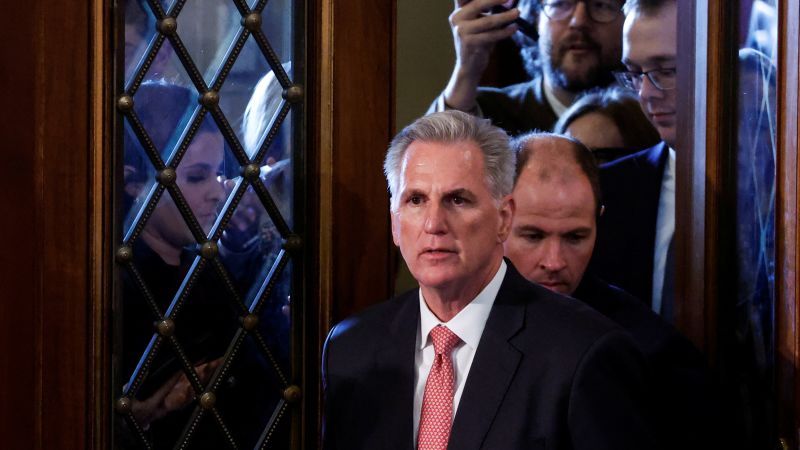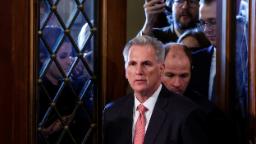

A version of this story appears in CNN’s What Matters newsletter. To get it in your inbox, sign up for free here.
CNN
—
It’s the easiest, most elegant and simple solution to Rep. Kevin McCarthy’s failure to bring Republicans together.
Just find a few Democrats already. Form a freaking coalition. Edge out these hardline Republicans and get the House to work.
But ask just about anyone in Washington and they’ll chuckle at your naivete and shake their heads. McCarthy won’t ever ask Democrats for help. And Democrats wouldn’t give it to him. So silly.
Which leaves the vast majority of Americans to watch as McCarthy gives more and more to the intransigent fringe of his party, even as it becomes painfully clear that more than four of them have no intention of ever supporting him. He can only afford to lose four GOP votes.
By the way, this is now the most drawn-out speaker election since the outbreak of the Civil War.
Meanwhile, if McCarthy was to finally give up and step aside, whichever Republican tried to find GOP consensus would be stuck with the concessions McCarthy has already agreed to.
While the idea of a bipartisan coalition feels impossible in today’s Washington, it’s not a crazy idea at all.
In fact, as CNN political analyst John Avlon pointed out on “CNN This Morning,” variations of power sharing or a moderate speaker upset could be seen in multiple states this year:
- In Alaska, nine Democrats and eight Republicans have put aside their differences to form a bipartisan majority in the state Senate.
- In Pennsylvania, a Democrat was named speaker of the state House after gaining support from Republicans. Following the vote, he announced he would govern as an independent.
- In Ohio, a moderate Republican managed to assume the state House speaker position with the support of Democrats.
Those are all unique situations with their own local dynamics, but it’s worth wondering what a coalition government in Washington might look like.
“A block of House Republicans should get together with Democrats to pick a speaker to run a coalition government, which will moderate the House and marginalize the extremists,” suggested John Kasich in a tweet that was viewed more than 5 million times. He’s the former Ohio governor and representative who has turned into a cheerleader for moderation in recent years.
Kasich has seen this process before. He was chairman of the House Budget Committee after the so-called “Republican Revolution” of 1994 and took part in the famous budget balancing of the second Bill Clinton administration, when the Democratic president was forced to work with a Republican House majority.
“The Democrats at some point have got to stop laughing at the Republicans and say, ‘hey, we have a golden opportunity here to come up with something that is more moderate and more workable,’” Kasich later told CNN’s Michael Smerconish on his SiriusXM podcast.
Rep. Don Bacon of Nebraska is another Republican interested in finding some Democratic help. He told CNN’s Jim Sciutto on Wednesday that McCarthy may have to start looking across the aisle and perhaps give Democrats more committee members or other concessions in order to get the government running.
“If the small handful refuse to be part of the team, you cannot let them hold you hostage, and that’s what they’re doing right now,” Bacon said, suggesting a move to negotiate with Democrats would take power from the fringe. “They don’t think we have the wherewithal to do anything without them. We need to show them otherwise.”
When Avlon suggested the idea of a bipartisan consensus-builder on CNN’s “Erin Burnett OutFront” on Wednesday, former Rep. Charlie Dent of Pennsylvania agreed that it is indeed what would happen in a “functional Congress.”
“Now, the question is, do the Democrats want to play ball with Kevin McCarthy? My sense is right now they do not,” Dent said.
He’s right. Democrats have been happy to continue to support their new leader, Rep. Hakeem Jeffries of New York, who, if elected, would be the first Black lawmaker to be House speaker.
McCarthy is so ingrained in the GOP machine and has spent so much time trying to contrast Republicans from former House Speaker Nancy Pelosi and Democrats that he might not be the right person to form a consensus and coalition government.
The retired Republican Rep. Fred Upton of Michigan, who voted to impeach former President Donald Trump, has said he’s intrigued by the idea of being a consensus candidate for speaker and would give some concessions to Democrats to make the plan palatable. The Constitution does not require a current House member to be speaker.
Former Rep. Adam Kinzinger, the moderate Illinois Republican who was part of the House January 6 committee and is now a CNN contributor, pointed out to Burnett on Wednesday that the role of the speaker as a partisan leader is relatively new.
Speakers previously simply oversaw House proceedings. Perhaps Democrats could get on board with supporting a consensus Republican who is not trying to use the House for partisan purposes.
“I think the institution, and frankly the country, could use somebody sitting in that position simply saying, here is how the House is gonna work. Go debate,” Kinzinger said. As this roadblock drags on, he said, that kind of out-of-the-box solution could become more likely, “although still pretty unlikely.”
It’s also true that there’s some bipartisanship already in the air in Washington. President Joe Biden appeared with Senate Minority Leader Mitch McConnell on Wednesday to announce new funding to rehab the deteriorating Brent Spence Bridge that ties McConnell’s home state of Kentucky to Kasich’s Ohio.
While the appearance was a photo op, it’s not the kind of thing you could have imagined McConnell doing with former President Barack Obama, who McConnell made it his mission to oppose on nearly every level.
Similarly, it would have been incredible to see Sen. Chuck Schumer, McConnell’s Democratic opposite in the Senate, appear with Trump.
As elegant as a bipartisan solution seems, it’s also completely far-fetched.
While the Republicans and Democrats who vote for the bipartisan option might be celebrated by the moderate middle of the American electorate, they’d be attacked by people deep in the party trenches, the politically engaged people who contribute to political campaigns.
There’s also the issue that members of Congress wait around for years for plum committee assignments. Jumping out of the system they know would jeopardize that.
But the biggest problem with the bipartisan solution is that McCarthy and Republicans just won their slim majority after an election in which they tried to separate themselves from Democrats. To join with them now would be awkward at best.
Yet, awkward might end up being the best option down the road if Republicans can’t figure it out on their own.
